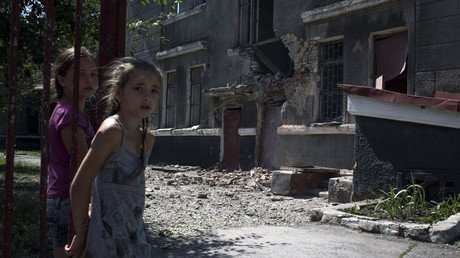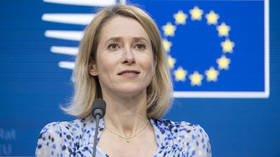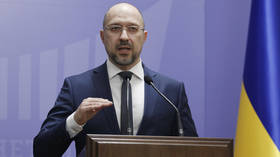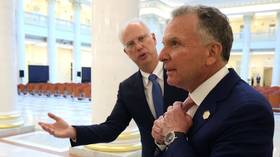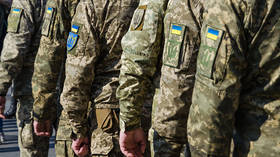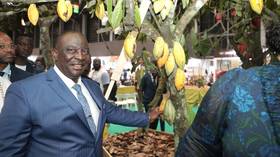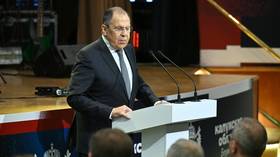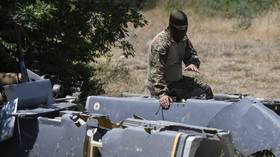Tough talks: Putin vows to extend Aleppo ceasefire as Merkel, Hollande accuse Russia of ‘war crimes’
Following tense Normandy Four talks, Russian President Vladimir Putin told reporters he had expressed Moscow’s readiness to extend the humanitarian ceasefire in Aleppo for as long as needed. Meanwhile, his EU counterparts accused Russia and Syria of “war crimes.”
German Chancellor Angela Merkel and French President Francois Hollande chose to focus on Russia’s role in the Syrian conflict, claiming that Moscow bears “responsibility” for the start of the political process in Syria.
Merkel alleged that the separation of terrorists from “moderate” rebels in Aleppo – something Russia and Syria have been demanding – is an impossible task without a complete ceasefire.
“It will not be possible to separate terrorists from civilians under bombardments,” Merkel said at the briefing.
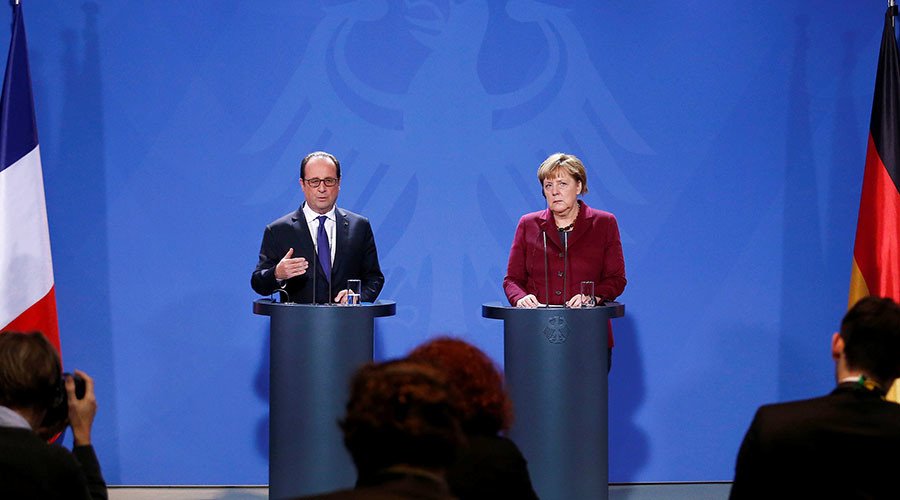
Hollande in turn called what is happening in Aleppo “a real war crime,” calling for “maximum” pressure to be exerted on Russia. The Western powers also expect that Moscow will put more pressure on Syrian President Bashar Assad to stop the bombing of rebel forces controlling eastern Aleppo, which comprise Al-Nusra terrorists and the groups the West considers moderate, such as the Free Syrian Army.
Merkel went as far as calling Russian and Syrian air strikes on terrorist hideouts in eastern Aleppo “inhumane.”
“This is a severe blow to the people of Aleppo, and we are sure that it is impossible to separate terrorists and civilians when such bombardments are taking place,” she said.
While Hollande admitted that “of course, there are terrorists in Aleppo” he stressed that “bombardments should be out of question.”
Both German and French leaders did not exclude that they may discuss new sanctions against Russia during the upcoming EU summit.
“We should not exclude this possibility,” Merkel said, calling the Berlin negotiations on Syria “tough” and “difficult.”
Putin held a separate news conference, reiterating the Russian position on Syria and lamenting that little progress achieved in talks on the conflict in eastern Ukraine.
The Russian leader said he had talked “about the Russian side's plans to extend the pause in delivering airstrikes [in Aleppo] for as long as possible, depending on the developments in this territory.”
Putin stressed that Moscow has been calling for the reinvigoration of work on a new Syrian constitution, which would be the first step toward a political transition in the war-torn country.
“I once again reminded our colleagues that Russia proposes to step up work in this sphere on devising and adopting a new constitution, on the basis of which preliminary election may be held and positions of all conflicting parties may be preliminarily coordinated,” Putin said.
Roadmap on eastern Ukraine by November – Normandy Four
The leaders of Normandy Four have not made any breakthrough on Wednesday when it comes to the conflict in eastern Ukraine. However, they agreed to work out a road map on a Donbass settlement by November, based on the Minsk agreements of February 2015.
All parties to the Berlin talks “confirmed their commitment to these agreements,” Putin noted, saying that Minsk Accords continue to serve as a basis for the peace process in eastern Ukraine.
While no new documents have been signed during more than 5-hour long talks in Berlin on Wednesday, the leaders of Russia, Germany, France and Ukraine, the four states that comprise Normandy Four group, have discussed several key points to be included in the next agreement to be thrashed out by the countries’ foreign ministries.
READ MORE: Militia commander killed in bombing attack in eastern Ukraine
One of the main obstacles in the way of the conflict resolution is the refusal of Kiev to approve legislation for local elections to be held in the self-proclaimed Republics of Donetsk and Luhansk.
Putin said that Russia is “ready to broaden the OSCE [Organization for Security and Co-operation in Europe] mission” in the zones of withdrawal and storage of heavy machinery.
Ukrainian President Petro Poroshenko earlier said Russia greenlighted “an attempt now to deploy an armed OSCE mission, which we call a police mission, which will ensure security during elections, as well as during the transitional period.”
Merkel confirmed that the agreement on granting OSCE observers better access to border regions has been reached, but was cautious about prospects of sending an armed or any other extra OSCE mission to the area.
The deployment of any additional OSCE mission depends on the approval of legislation on local elections, which so far has not been passed by Kiev, the Chancellor pointed out.
“If there is an election process, if there are election rules, then we can also talk about an OSCE mission, including armed missions. But at the moment it is not an urgent issue,” she said, adding that that “meetings should be regular for the peace process not to lose momentum.”
Hollande sided with Merkel and described the arrangement of Donbass elections as the “main task” of the political process in Ukraine.
READ MORE: ‘Attacking terrorists in Aleppo is only way to protect civilians’ – Assad
Other unresolved issues remained, such as the definition of contact lines, with Poroshenko insisting that Debaltsevo, currently under control of the eastern Ukrainian rebels, should be handed over to Kiev.
The parties aim to continue working together on settlement in eastern Ukraine, in particular, in reaching “final agreements on the framework of implementation and enforcement of the agreement on special status of certain areas in Luhansk and Donetsk regions,” Putin said.
The Normandy Group will meet in November at the level of foreign ministers who are expected to thrash out the details of the roadmap.
